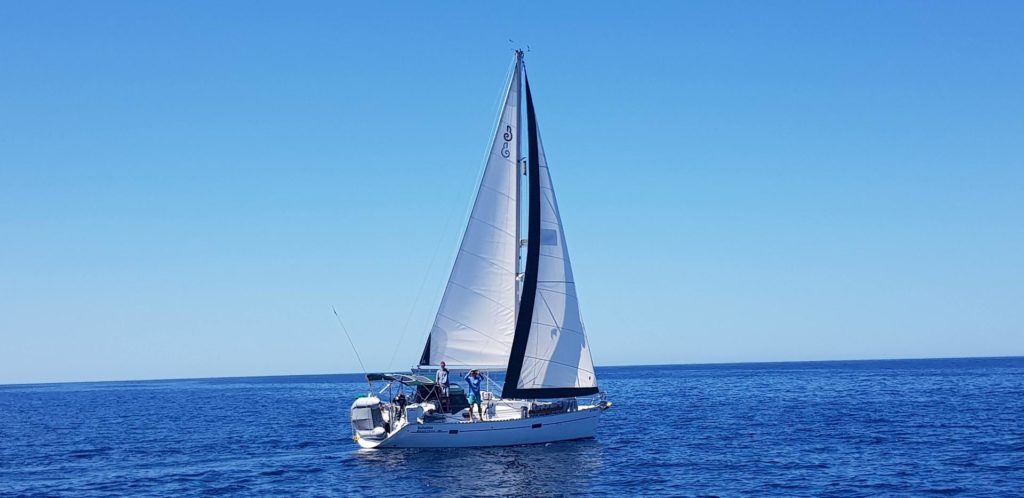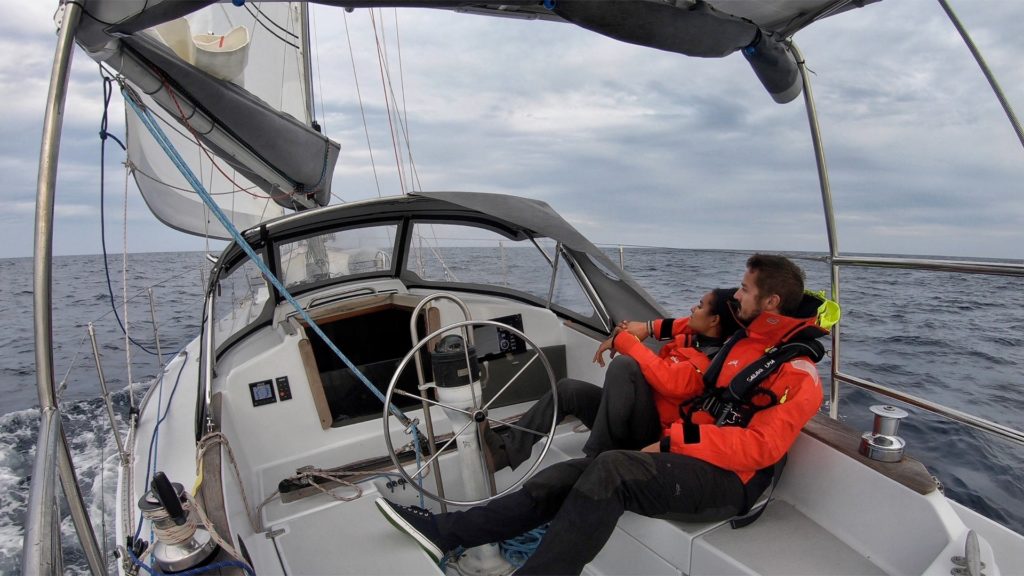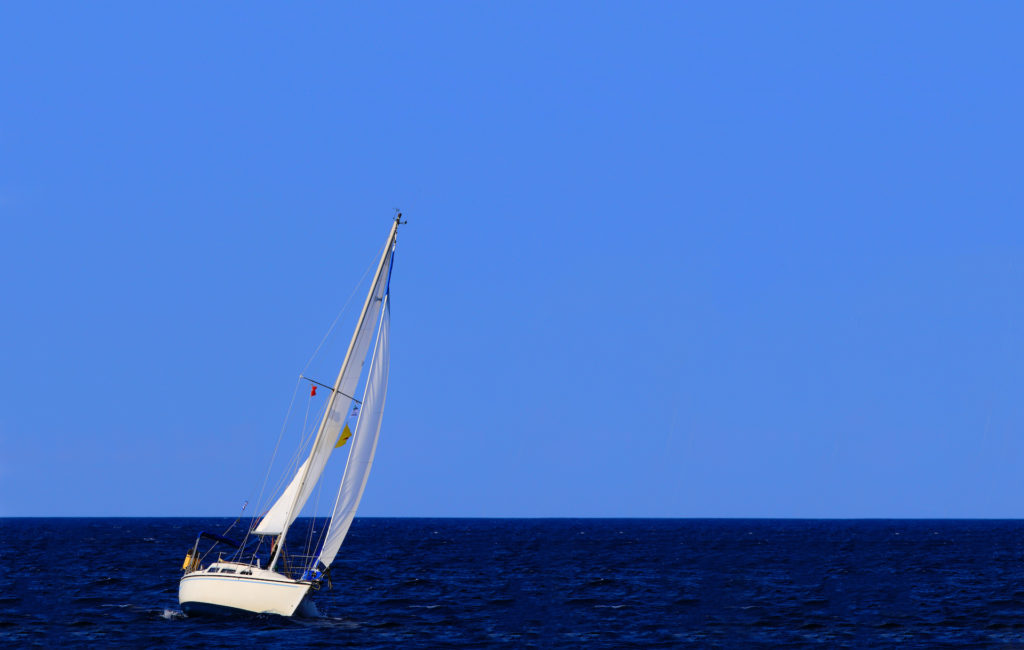
MENUMENU
TALK TO AN EXPERT
Special Hours: 7AM – 6PM PST
TALK TO AN EXPERT
Special Hours: 7AM – 6PM PST
Living on a sailboat can be difficult, but the challenge is worth it for many people. There’s an immense sense of freedom in knowing that you have everything you need right on your boat. But do the challenges outweigh the euphoria of setting sail on the open water? In this article, we discuss everything you need to know about living on a sailboat, the 10 biggest challenges you may encounter, and whether or not it’s worth it. Let’s dive in!

Living on a sailboat will look slightly different for everyone, depending on what kind of sailboat they have. For example, living on a 40ft beamy motor sailer will give you much more room than a 22ft O’Day. However, there are several factors you need to consider regardless of the size of your boat.
First, you’ll need to have a system to get rid of your waste. This could be a composting toilet or a head with a black tank that you offload at a marina. You’ll also need enough freshwater capacity to sustain you on long trips. Moreover, you’ll need to factor in your electricity needs. Will you be out on the water for days at a time? If so, you may want to invest in solar (or at least have a sustainable way of charging your batteries). However, if you’ll be plugged into shore power at a marina most of the time, this may be a non-issue.
The size you need will depend on your living style and family size. If you’re a single person, you might be able to get away with living on a 22ft O’Day. This would be much like living in a van space-wise. However, if you’re a family of four, you’d be much more comfortable in a 50ft catamaran.
Another factor you’ll need to consider is how long you’ll go between stopping at marinas. This influences the number of provisions you’ll need to store and the size of your battery bank. If you’ll be hooked to shore power most of the time with access to fresh water and a grocery store, you’ll be able to get away with a much smaller boat.
Like anything, a new lifestyle will be challenging at first, but as you acclimate to a routine and get used to your daily tasks, things will get easier. You’ll learn to live minimally and understand which items are absolutely essential.
You’ll also realize how often you want to set sail versus staying at the marina. Thus, things will get easier over time, and you’ll adapt. And in reality, it’s almost impossible to know if this is the lifestyle for you without giving it a try!

Regardless of the size of your boat and how often you set sail, there are certain inevitable hardships. Below, we discuss the 10 biggest challenges of living on a sailboat and some tips to help you overcome them!
Like water, you must go with the flow. After all, we can’t control (or sometimes even predict) the weather. For example, a storm may blow in just as you plan to leave the harbor. Thus, it’s helpful to be as flexible as possible.
Be prepared to sit in a harbor for two days as a storm passes or even postpone a trip for a week or more because of the weather. The trick is to enjoy the ever-changing journey and embrace whatever challenges arise.
This seems like common sense when living on a sailboat, but we can’t stress this one enough. The water is constantly moving your boat; your entire home is rocking and swaying all the time. Take a moment to think about your daily living tasks and how this might affect things.
For example, cooking, using the bathroom, sleeping, and really anything you do will be that much more difficult because of the constant movement. Because of this, we recommend having plenty of handles and rails to hold onto, secure storage, and a Gimbal stove that stays level even as the boat tips.
One of the biggest challenges about living on a sailboat is access to electricity. When you’re away from shore power, you’ll have to generate your own energy. Many people choose to do this through the use of solar panels.
Of course, you’ll be limited by how much space you have on your boat for the panels, and you may have to supplement your energy needs with your boat’s engine. Whatever you choose, you’ll need a reliable battery bank to power your electronics. Without a doubt, lithium is where it’s at.
Replacing your marine lead-acid house batteries with lithium will give you more power for longer. They’re lighter, faster to charge, and can withstand infrequent and irregular charge cycles that would damage normal batteries.
→ Learn more about Why Boaters Are Choosing Lithium For Their Marine Batteries
Sailboats have very limited storage, which can be a big hassle when keeping food stocked. More likely than not, you’ll have a smaller-than-average refrigerator, which will make keeping perishable goods fresh a challenge. Thus, it’s helpful to be creative with meal ideas and learn how to stretch dry goods such as rice, pasta, and oatmeal.
The size of your holding tanks will directly correlate with the size of your boat. Thus, keeping freshwater stocked while living on a sailboat could be a huge challenge if you have a smaller boat. For example, a 26ft O’Day has a freshwater tank of around 20 gallons. And as most sailors know, 20 gallons disappears very quickly when trying to wash dishes, flush your toilet, and keep hydrated and clean.
Bigger boats around 36ft or longer will have much larger freshwater tanks (80 gallons or more). However, even with this increased capacity, you’ll still have to be mindful of how you use your precious freshwater.
As we mentioned before, a major factor you’ll need to consider when you’re cruising is how you’re going to take care of your waste. This can be a challenge because if you choose a standard marine toilet, you’ll have to consider how much black water storage you have on your boat. Not only that, but traditional marine toilets are notorious for breaking. Because of this, many mariners choose to go with a composting toilet.
What happens when your home is constantly in motion? Things break! This includes everything from lines to important electronics like the navigation system and the autopilot. This is why it’s so important to have good chaffing gear, knowledge, and backup equipment. Moreover, keeping things organized and neat will allow you to know exactly where an item is in a pinch.
If you’re traveling with other people, keep in mind that privacy while living on a sailboat is very limited. This isn’t such a big deal if you’re a solo traveler or a couple, but if you’re a family with kids or traveling with friends, you’ll get to know each other real quick. Sleeping, changing, and bathroom space will all be limited. This is less of an issue in large catamarans or boats with a spacious forward cabin, but space is limited either way.
Remember that Gimbal stove we talked about? It’s an absolute necessity in order for you to cook without spilling boiling water or hot food all over the place. It operates similarly to a gimballed compass or gyroscope and stays level even when the boat is heeling or swaying. Another challenge? Not falling over while cooking! Because of this, we recommend plenty of handles and rails to steady yourself in the kitchen area.

Many experienced sailors have a story about their navigation failing and having to chart their way back to a harbor. Therefore, for serious navigation, you’ll want a backup mode of communication and navigation such as the Garmin InReach Satellite Tracker, which uses satellite capabilities to communicate and send GPS coordinates from wherever you are in the world.
Beyond that, many sailors want to remain somewhat connected to the internet to stay in touch with loved ones and keep abreast of world and local news. Some may even want to work remotely from their sailboat. Not having the proper gear and not getting a strong enough signal may limit your travels.
For many avid sailors, it’s impossible to put a value on the freedom and beauty this lifestyle offers. There’s nothing like waking up to a stunning sunrise surrounded by open water or watching porpoises try to keep pace with your boat. Many people would do absolutely anything for these experiences, and the hardships pale in comparison.
What do you think? Is living on a sailboat worth it? Let us know in the comments below!

We know that building or upgrading an electrical system can be overwhelming, so we’re here to help. Our Reno, Nevada-based sales and customer service team is standing by at (855) 292-2831 to take your questions!
Also, join us on Facebook, Instagram, and YouTube to learn more about how lithium battery systems can power your lifestyle, see how others have built their systems, and gain the confidence to get out there and stay out there.
Shop Best Sellers








Ask a technical specialist now at 855.292.2831
Stay in the Know
Take our short Customer Survey for a chance to …
WIN a $300 Visa Gift Card
One thought on “10 Biggest Challenges of Living on a Sailboat”
This has been a dream of mine for many years so maybe one day real thank you for the in sight thank again